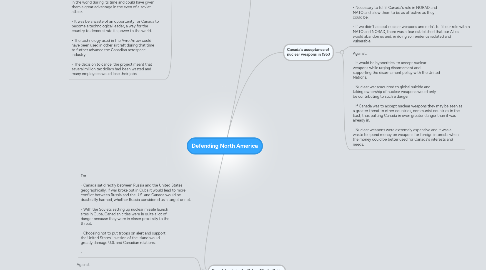Defending North America
by Elise Brianna

1. The Scrapping of the Avro Arrow
1.1. For: - Soaring production costs: it would cost the country too much money that they needed to use on other things and they didn't want to go deep into debt again or cause another Depression. - Few orders: the project cost lots of money and if there weren't enough people to buy the finished product they'd never have enough to finish the project itself. - The company, A.V. Row Canada, was too disorganized to continue the project. - Bombers were slowly being replaced by missiles so it didn't really make sense to put so much money into a system that wouldn't be of any use any more. The Avro Arrow was being built specifically to shoot down Soviet bombers.
1.2. Against - It would have been the most advanced fighter plane in the world during its time and could have given them a great advantage in the even of a soviet attack. - It was be a waste of an opportunity for Canada to become a technological leader, a way for the country to demonstrate its power to the world. - The technology used in the Avro Arrow could have been used in other aircraft during that time to further advance the Canadian aerospace industry. - The decision to cancel the project meant that several million tax dollars had been wasted and many employees would lose their jobs.
2. Canada's acceptance of nuclear weapons in 1963
2.1. For: - While many other countries were in possession of nuclear weapons, the weapons were necessary for the protection of the country. - It would maintain our good relations with the United States rather than causing potential harm to trade. - Necessary to fulfill Canada's role in NORAD and NATO and allow them to be as effective as they could be. - If we didn't accept nuclear weapons and didn't fulfill our role within NATO and NORAD, there was a fear established that our Allies would abandon us and, in doing so, render us isolated and vulnerable.
2.2. Against: - It would be hypocritical to accept nuclear weapons while urging disarmament and supporting the disarmament policy with the United Nations. - Nuclear war amounted to global suicide and taking ownership of nuclear weapons would only be contributing to such a danger. - If Canada was to accept nuclear weapons they may be seen as a greater threat to other countries, communist countries in the East, thus putting Canada in even greater danger than it was already in. - Nuclear weapons were extremely expensive and it was a waste to spend money on weapons for foreign interests when the money could be better used for Canada's interests and needs.
3. Canada's role in the Cuban Missile Crisis
3.1. For - Canada sat directly between Russia and the United States geographically. If war broke out in Cuba it would lead to more conflict between Russia and the U.S. and Canada would be drastically harmed, whether Russia considered us a target or not. - With the Soviets setting up nuclear missile launch sites in Cuba, Canadian cities were in quite a lot of danger because they were in closer proximity to the threat. - Choosing not to put troops on alert and support the United States' invasion of the island would greatly damage U.S. and Canadian relations. -
3.2. Against - Canada needed to protect her interests and independence, and involvement with foreign interests of the U.S. could hinder this and cause renewed dependence on another greater power. - It was doubtful from the photos whether the nuclear missile launch sites were actually being built and it would have been more prudent for the United Nations to send a fact-finding mission to Cuba to gather Intel. - Accepting atomic weapons in Canada was as of yet not favourable to the government and complying to the demands to place NORAD defences on alert would bring these weapons into the country. - Cuba was trying to free itself of American control and this was not an issue that really impacted Canada in the first place. It was a problem between the United States and the government of Cuba and Canada wasn't going to get involved only because their ally was.


